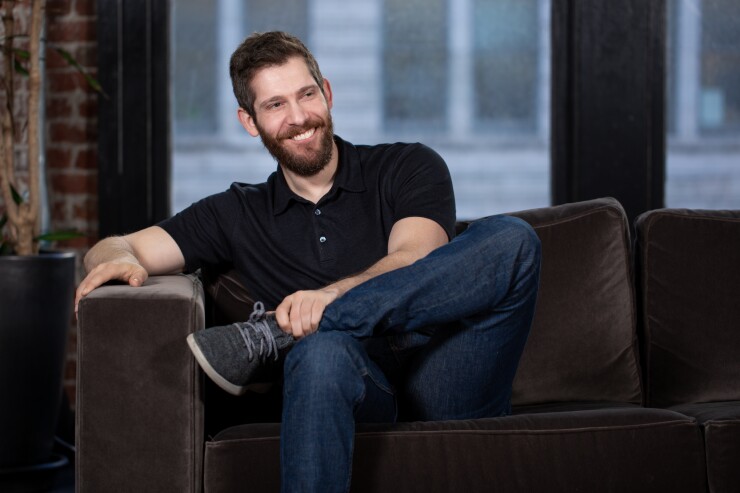The financial health app provider Even on Thursday added an automated savings tool to its offerings, which already include a dashboard of the user’s financial picture and paycheck advances.
The new feature lets users set aside funds for up to three savings goals and devote as much as 10% of their paycheck to each goal. The funds will be automatically transferred to each goal’s corresponding federally insured account every pay period.

“This is the whole point of what we do: to make it possible to save money,” CEO Jon Schlossberg said. “First we had to make it possible to save, given how impossible it is for most Americans. Once we made it possible, we could add this second step" of automating the savings process.
Even is one of a pack of fintechs pursuing smart ideas to help people with their finances that the firms aim to test and implement quickly.
Digit, which was the pioneer of automated savings, this week added the ability to automate savings for and payment of cellphone bills. MoneyLion, Qapital and others have also been adding features to their financial wellness offerings. The robo adviser Wealthfront says it will soon have a “driverless money” app that pays people’s bills without their having to think about it.
What Even does
Even’s app already does several interesting things.
Through partnerships with large employers like Walmart, it offers a scheduling tool that shows hourly employees how much they have worked, how much money they have earned and how much money they are going to have when they get paid. About 400,000 Walmart employees currently use Even.
“For the 50% of American workers who make inconsistent income from paycheck to paycheck, this is a pretty big deal because all of a sudden you'll know how much money you'll have, which allows you to plan," Schlossberg said. "People use this part of the app every day.”
Even calculates the amount of money a user is going to make in a given month and all the bills that person needs to pay, to come up with a “safe to spend” amount.
“It helps you understand how much money you're going to have and helps you make a plan to live within your means,” Schlossberg said. Then the user can steer clear of predatory products, which he likens to “carrying your money around in a bucket, but the bucket has a hole at the bottom,” he said.
Even gathers payroll, time and attendance data from employers, bank account data through Plaid, location and demographic data to create a picture of a user’s financial health.
“We can tell that you are a single mom with two kids by looking at all the data that we have,” Schlossberg said. “We know how much money you make and we know where you live. We know what the cost of living in that area is.”
Based on all this data, Even will come up with personalized suggestions such as savings goals. A customer living in a metropolitan area might be advised to create a $5,000 emergency fund, where someone in a rural area might get a lower figure, for instance.
The recommended actions tend to be common sense: set up an emergency fund, pay off higher-rate debt before low-rate debt.
Unlike apps that aim for behavioral finance — automatically doing things like saving and paying bills for people — Even has made the deliberate choice to not do things for its users, so they learn good habits for themselves.
“If you want to learn how to fish, what is the best way to do that?" Schlossberg said. "It isn't going online and reading about fishing, it's getting in the river — ideally with someone who knows how to fish and can cast a rod with you for the first few times.”
Setting customized defaults is similar, he argued.
“You feel empowered,” he said. “You feel like you're the one that took the actions, you're the one learning, you're the one improving. That's very different than having someone else do it for you.”
Even also offers Instapay, a tool that lets users draw some money from a pending paycheck.
Wage advance products are controversial because they tend to come with high fees and because, consumer advocates argue, people become dependent on them like drugs and get themselves deeper into financial trouble.
In Even’s case, there is no fee for early wage access. Everything the app does is covered by an $8 monthly subscription fee, which some employers subsidize.
Instapay is Even’s least-used feature, Schlossberg said, and the average advance is only about $150.
“We view on-demand pay as a commodity,” he said. “It’s a necessary piece of the puzzle, but we want to get out of it. It's not healthy by itself for people. ... It’s not a substitute for having your own savings,”
The bigger picture
In the bigger picture, what companies like Even, Digit, Tally, Qapital and many others are trying to address is a systemic problem: The U.S. economy is failing the working poor.
People working multiple jobs cannot afford to buy food after they have paid their rent and utility bills, yet
“This is the issue of our time,” Schlossberg said.
His recommendation: instead of measuring the economy in terms of gross domestic product, there should be a measure of whether people can get jobs that allow them to live the lives they want.
"The No. 1 thing we need to change is changing our definition of what success is growing the economy," he said. "It’s not producing and buying stuff if our people are living in their cars. The goal should be, do people feel like they have a foundation on which they can achieve the American dream — have a good job, be able to build a family and take care of them and spend quality time together.”





